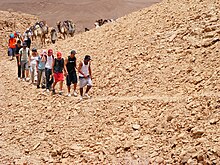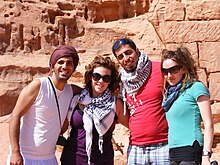Musalaha
| Musalaha | |
|---|---|
| legal form | NGO / NPO |
| founding | 1990 |
| Seat | Jerusalem |
| management | Salim J. Munayer, director |
| Website | www.musalaha.org |
Musalaha ( Hebrew מוסאלחה; Arabic مصالحة, DMG Muṣālaḥa ) is a non-profit organization in Jerusalem that promotes reconciliation between Israelis and Palestinians using principles such as peace, justice and love.
overview
The name Musalaha has its origin in the Arabic word for reconciliation. The mission statement of their official homepage says: “Musalaha is a non-profit organization that tries to promote reconciliation between Israelis and Palestinians. We try to promote and facilitate reconciliation - first among Palestinian Christians and Messianic Jews , then also beyond them. ”According to the website, Musalaha also tries to support the building of bridges between different parties in the Israeli and Palestinian communities according to the principles of reconciliation. Musalaha works with many different organizations worldwide - both with Reconciliation Ministries in the United States and Amzi in Germany and Switzerland, as well as with local Palestinian and Israeli organizations. Musalaha's board members are Messianic Jewish and Palestinian Christian leaders in Israel and the Palestinian Territories .
History of Musalaha
The Israeli Palestinian Salim J. Munayer from Lod and experts on both sides recognized the problem of the lack of unity between Israelis and Palestinians during the First Intifada and founded the Musalaha ministry in 1990 "as a tool to guide people into the process of reconciliation."
The vision was a neutral place for Messianic Jewish Israelis and Palestinian Christians to meet and receive instruction on the subject of reconciliation. Musalaha began taking groups of Palestinians and Israelis on trips into the desert. Munayer communicated this vision with: “I would like to try to take groups from both sides into the desert for three days. I believe that we can tear down barriers and develop relationships if we bring them out of their familiar surroundings and into a situation in which they have to work together. ”
Musalaha developed
from a small grassroots movement into a growing nationally and internationally recognized organization a variety of reconciliation activities. Musalaha does not ignore divisive political and theological issues such as "Theology of the Land", justice , Israeli settlements and Palestinian terrorist attacks, but tries to bring both sides together and develop friendships before difficult talks. Salim J. Munayers: “When we founded Musalaha, we knew that we had to deal with these issues, but also understood that Musalaha had to find a secure framework in which people develop relationships and then express themselves, exchange ideas, learn from one another and could discuss the critical issues. Many wanted to take care of these problems immediately without understanding the importance of the process: it is about these issues being tackled at the right time and in the right way within the framework of the new friendships. "
Amongst Musalaha's early supporters was the Open Doors leader, Brother Andrew . He wrote of Musalaha: “Of all the ministries in Israel, I was most drawn to this one. It seemed the most ambitious, but also the riskiest. The idea for this did not come from missionaries from abroad, but had its origin in the local Christian community. The organization didn't just talk about the problem between Palestinians and Jews. It brought two sides together and provided funds to reconcile them. "
Projects
Musalaha has developed many different projects over the years aimed at bringing Israelis and Palestinians together - from desert tours to conferences and workshops. Although Musalaha as an organization has no political stance or agenda, Salim Munayer limits: “To say that Musalaha does not have a political agenda would be naive because we are all politically involved here in Jerusalem - just as we breathe or eat. Everything we say and do has political consequences ... Our political goal is to see nations in the Middle East, and especially Israeli Jews and Palestinian Arabs, reconciled with the good news. [...] “ In order to bring about reconciliation , Musalaha's activities were expanded from desert camps to other projects. They want to tell Israelis and Palestinians about the message of reconciliation and equip them with the craft to make that vision a reality.
children
Musalaha runs an annual summer camp to bring Israeli and Palestinian children (between nine and 12 years old) together in a friendly, neutral environment. Many of these young children are confronted with someone from the other side for the first time, which can be a formative experience and has a positive impact on their perception.
youth
Musalaha annually organizes a Youth Desert Encounter for around 50 Israeli and Palestinian youths, where they are trained in reconciliation issues and have the opportunity to develop friendships with one another. It also includes other activities such as hiking and camel riding. The camp takes place in the Arabah or Negev deserts in southern Israel .
Young adults
Another annual Musalaha event is the Young Adult Desert Encounter , which takes place in the Wadi Rum desert in Jordan . Although it is similar to the youth camp, the discussions move on a higher and deeper level as most of the participants are students and many of the Israelis have already completed their compulsory military service. Musalaha sees young adults as an important target group to be reached because they are the leaders of the future. The focus of this camp remains reconciliation and friendship building.
Women
Musalaha has developed a network of women's groups that brings together Israeli and Palestinian women for friendship building, exchange and the teaching of reconciliation. Several annual conferences and seminars are organized that are geared towards intensive reconciliation training. These women are also encouraged to start their own reconciliation events as well as humanitarian projects . The emphasis on women’s labor comes from acting as advocates for change in their neighborhoods and having significant influence as mothers and working members in Israeli and Palestinian societies.
Leadership training in churches
The leaders of each ward have great influence over others. Musalaha actively seeks to contact these leaders from Israeli and Palestinian communities to educate them on the subject of reconciliation so that they can effectively change the perspective of those around them in a positive way. Numerous conferences and seminars are organized annually for community leaders and their families.
Publications
Many articles and project reports as well as German newsletters are available on the Musalaha homepage. Musalaha also published five books
- You have heard it said - Events of Reconciliation , by Jonathon McRay (Resource Publications, 2011)
- This book is a collection of stories from participants in Musalaha activities. It tells about the life of Israeli and Palestinian people in conflict.
- In the Footsteps of our Father Abraham , edited by Salim J. Munayer (Art Plus, 1993)
- This book is a collection of articles by Messianic Jewish and Palestinian Christian leaders on the subject of reconciliation - from biblical foundations to practical application. It also includes reflections and observations from participants in various Musalaha events.
- Seeking and Pursuing Peace: the Process, the Pain, and the Product , edited by Salim J. Munayer (Yanetz Ltd., 1998)
- This book is a collection of articles by Messianic Jewish and Palestinian Christian leaders such as Naim Ateek and Arnold Fruchtenbaum and others. It covers the topics of peace and peace building and also includes some articles on Musalaha events.
- The Bible and the Land: An Encounter , edited by Lisa Loden, Peter Walker, and Michael Wood (Musalaha, 2000)
- This book is a collection of articles on the theology of the Holy Land by a few contributors from different perspectives.
- Musalaha Worship, عبادة مصالحة, הלל מוסאלחה , (Musalaha, 2004)
- This book is a compilation of worship songs in Hebrew and Arabic - collected and published by Musalaha.
Web links
- German Musalaha homepage
- Article by Musalaha
- Salim J. Munayer, "Reconciliation: Sharing Living Water in the Desert" from Called and Sent Magazine - Article on reconciliation in 3 parts
- Salim J. Munayer, "Peacemaking and the Armor of God" from Christian Mission Society (CMS) - Article on peacemaking
- Joshua Korn, "The Limits of Love" from Sight Magazine - Article on Musalaha youth leader training conference
Individual evidence
- ↑ http://www.musalaha.org
- ↑ http://www.bereconciled.org/
- ↑ Archived copy ( memento of the original from January 13, 2011 in the Internet Archive ) Info: The archive link was inserted automatically and has not yet been checked. Please check the original and archive link according to the instructions and then remove this notice.
- ^ Salim J. Munayer, "On the Road to Reconciliation," excerpt from In the Footsteps of our Father Abraham , edited by Salim J. Munayer Ph.D. (Art Plus, 1993, 2002) pp. 81-82
- ^ Brother Andrew and Al Janssen, Light Force, The Only Hope for the Middle East , (Hodder & Stoughton, 2004) p. 127
- ^ Munayer, "On the Road to Reconciliation," from In the Footsteps of Our Father Abraham , 83
- ^ Brother Andrew and Al Janssen, Light Force , pp. 126-128, 304
- ↑ Baker, “Forging Biblical Reconciliation Amid Conflict,” from Seeking and Pursuing Peace , p. 133
- ↑ Archived copy ( Memento of the original from May 26, 2011 in the Internet Archive ) Info: The archive link has been inserted automatically and has not yet been checked. Please check the original and archive link according to the instructions and then remove this notice.
- ↑ Archived copy ( Memento of the original dated May 3, 2011 in the Internet Archive ) Info: The archive link was inserted automatically and not yet checked. Please check the original and archive link according to the instructions and then remove this notice.
- ↑ Archived copy ( Memento of the original dated May 3, 2011 in the Internet Archive ) Info: The archive link was inserted automatically and not yet checked. Please check the original and archive link according to the instructions and then remove this notice.

